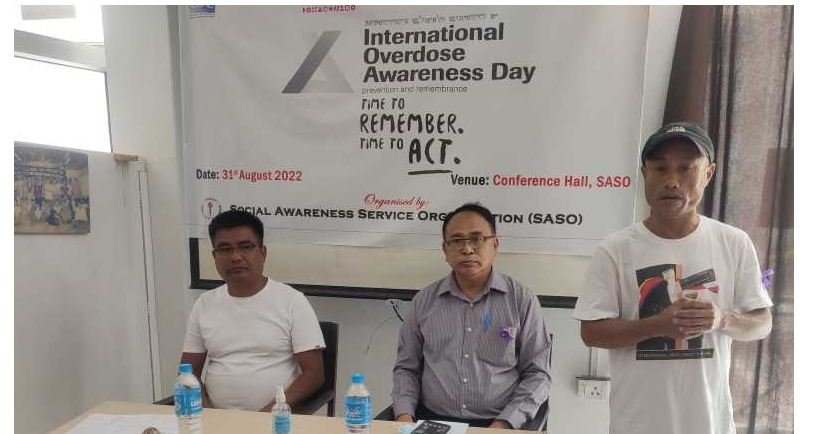Against the backdrop of the War on Drugs in Manipur, on average, 20-25 people are admitted to RIMS and JNIMS hospitals for drug overdose in Manipur on a monthly basis.
Manipur has been witnessing an increase in the number of drug overdose cases with the increase in the number of drug abusers and cases of drug trafficking. Considering the alarming situation, the Manipur State AIDS Control Society has identified 25 government hospitals in various places to provide treatment facilities for drug overdose cases, MACS joint director Abhiram Mongjam said on Wednesday.
Mongjam was speaking at the observance ceremony of International Overdose Awareness Day 2022 on Wednesday. The event, organised by the Social Awareness Service Organisation (SASO) at Wahengbam Leikai, Imphal West, was held under the theme “Time to Remember. Time to Act”.
He further said that as per the finding of SASO, the total number of overdose cases they had reported was 1369 while 29 persons died between April 1, 2016 to July, 2020.
On the other hand, according to data collected from hospitals by MACS, the number of persons admitted for overdose during 2021 alone was 326, while nine were reported dead due to drug overdose.
The state government has taken up the initiative of identifying the places or sites where overdose cases are found in increasing numbers. So far, as many as 25 hospitals have been selected to facilitate overdose treatment, he added.
Mongjam also said that most people are aware they can help save the lives of those with overdose but won’t do it due to stigma and discrimination against drug-dependent people.
Appealing to the people of the state to extend support in saving youngsters from drug overdose in Manipur, he said, “It is high time to create massive awareness on criminalising or underestimating drug abusers. Drug addiction is a kind of illness that needs support from every section of society to treat it”.
SASO project manager Kshetrimayum Dinesh said that in Manipur, the most common reason for overdose is due to mixing heroin with depressants or with alcohol.
Intake of large quantities of sleeping tablets can also cause opioid overdose. People who used drugs after returning from treatment in rehabilitation centers are also at risk of overdose, he added.
He further said that a study in Manipur reported that one-third of heroin users experienced drug overdose in their lifetime.
The issue of drug overdose was unnoticed until 2009 when few NGOs started raising their voice on the issue of accessing naloxone (drugs to save from overdose) through project ORCHID and MACS, he said, adding that community-led overdose response started in 2004 by SASO. Through this response team, many lives were saved from overdose and many have started to lead normal healthy lifestyles.
However, some also lost their lives even when the team tried their level best to save them due to late reporting by the family members and peers, he said.
Meanwhile, Manipur has the third highest number of HIV cases in India, with a total of 28,500 positive cases, Manipur State Aids Control Society (MACS) assistant director Phanjoubam Lanngamba said at a media workshop in Churachandpur Wednesday.
The workshop on Newly adopted HIV and AIDS (Prevention and Control) Act 2017, which was held at Synod Hall, IB Road in Churachandpur district, was organised by Khelen Thokchom Trust (KTT), Manipur with support from Manipur State AIDS Control Society and journalists from the district.
Churachandpur has 4,239 total HIV positive cases of which, 105 total HIV positive cases were detected during the period April-July 2022, and 2,072 are undertaking ART treatment, Churachandpur District AIDS control Officer (DAO) Romeo Senate said at the workshop.
The DAO commended KTT, Manipur for organising such a programme on HIV and AIDS (Prevention and Control) Act 2017
Phanjoubam Lanngamba spoke on the topic ‘Media Ethics on HIV & AIDS reporting’ and mentioned that MACS was established on March 28, 1988 to monitor HIV cases in the state. He added that with total positive cases of 28,500, the state ranks the third highest state with HIV in India.
“The aim is to eliminate the virus by the year 2030, and it can be made possible through mass testing at the high risk areas followed by the necessary steps for treatment,” he said.
Phanjoubam Lanngamba also mentioned the importance of the media in disseminating awareness and information to the public.
The workshop, which began with a welcome address by KTT general secretary Sobhapatti Samon, concluded with an interaction programme with experts from MACS and reporters from Churachandpur Working Reporters Union and Churachandpur District Journalist Union.
IEC and Mainstreaming, MACS, Omajit Laishangthem, and Manipuri Hill Journalists’ Union (MHJU) general secretary S Nengkhanlun attended as presidium members.

